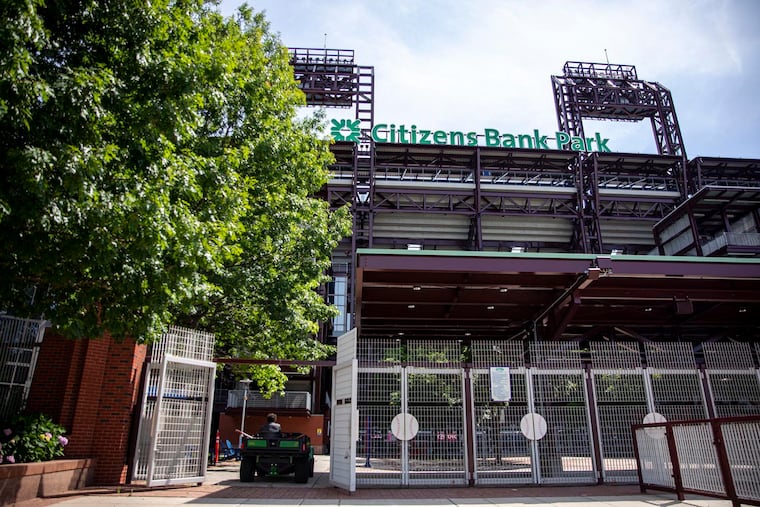Taking a swing at the factors that will determine when MLB will end its lockout and open the season
Which side will blink first? As usual, follow the money.

OK, what’s next?
Two days after Major League Baseball commissioner Rob Manfred called off the first two series — five or six games per team — of the regular season, lead negotiators for the owners and players got together Thursday in New York to discuss a way forward. The informal meeting lasted 90 minutes and touched on several topics but didn’t end with the scheduling of another bargaining session.
Time is a key element now. The owners’ lockout will enter its 93rd day Friday. Will the ensuing days and weeks be marked by frequent talks, such as the nine consecutive days of negotiations in Jupiter, Fla., or devolve into a prolonged staring contest and additional cancellations?
» READ MORE: Cost of MLB owners’ gamble will be more than just canceled games | Scott Lauber
The sides, more accurately described as adversaries, did move closer to each other in some areas this week. But they dug in to their respective stances on others, notably the competitive-balance tax. And the erasure of games, which Manfred said won’t be rescheduled, will bring a new set of topics to the table, including back pay and service time for missed games.
In a news conference Tuesday, Manfred said, “Our position is that games that are not played, players will not get paid for.”
“Our position,” the players’ lead negotiator, Bruce Meyer, said in a separate news conference, “is that if the league decides unilaterally to pull down games and then we have a deal, the players should get compensated for those games.”
Is anyone having flashbacks to 2020, when MLB and the players went 12 rounds over the length of the schedule and compensation in a pandemic-shortened season? Based on how well that negotiation went, these talks could get even uglier before coming to a merciful denouement.
So, which side will blink first? As usual, follow the money.
Based on a 186-day regular-season schedule, Bryce Harper stands to lose approximately $148,056 per day beginning March 31 when the season was supposed to open. At the other end of the payroll spectrum, where a majority of players reside, lost wages would average $3,067 per day based on the 2021 minimum salary of $570,500. (MLB is proposing a $700,000 minimum; the players are seeking $725,000 and larger annual raises.)
The union planned for this scenario and made $5,000 stipends available to players on Feb. 1 and March 1. The amount will reportedly increase to $15,000 per player in April. The union also will cover players’ medical benefits once they expire on April 1. But there are other ramifications. If MLB follows through on withholding service time, it will affect players’ timelines for free agency and salary arbitration.
» READ MORE: MLB’s ‘disastrous outcome’ is here: What missing games means, next steps in lockout
It’s more difficult to pinpoint the financial hit for ownership. The Atlanta Braves and Toronto Blue Jays are the only teams owned by publicly traded companies. Last week, Liberty Media Corporation reported that the Braves turned a $104 million profit in 2021 and $6 million in revenue per home game.
April tends to be the least profitable month of the season for most teams because colder weather and children being in school conspire to lower attendance. Those factors have fueled speculation that the hawks on management’s side are some small- and middle-market owners who oppose significant hikes to the luxury-tax threshold and wouldn’t mind a later start to the season, especially if it means cutting back the players’ salary.
But there’s also the matter of television contracts. The Athletic reported that many regional sports networks require teams to issue rebates after 25 missed games. NBC Universal declined to comment Thursday on the Phillies’ arrangement with NBC Sports Philadelphia.
Regardless, it’s a potentially expensive game of chicken for both the owners and players. And the continuation of a lockout that is entering its fourth month would be damaging for the industry as a whole, especially given the number of entertainment options available to fill the void.
It took Cal Ripken Jr.’s breaking of an unbreakable record in 1995 and an artificially-enhanced home-run race in 1998 to revive MLB’s popularity after the 1994-95 strike, and even then, average per game attendance didn’t surpass pre-strike levels until 2006. And baseball is less popular now than it was then among casual fans.
Both sides should see that as the biggest incentive to reach an agreement, especially because it may not take much more than the owners increasing their proposal on the luxury-tax thresholds.
“It’s the league’s lockout,” Meyer said. “They can decide to end it whenever they want. Players don’t really have much of a choice in that. But players are committed to fighting for a deal that they think is fair.”
» READ MORE: The Phillies' Ranger Suárez as the face of the MLB labor fight